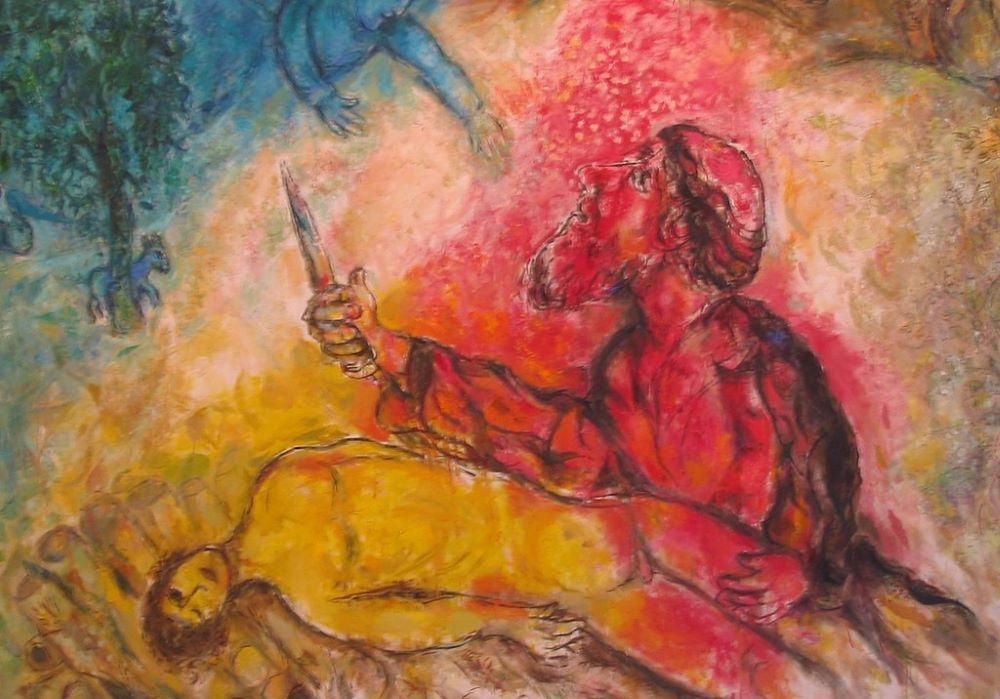
Detail from "Sacrifice of Isaac" by Marc Chagall (Wikimedia Commons/Creative Commons/Rokus Cornelis/Musée Marc Chagall)
What do you feel when someone says "God is testing you"? Really, doesn't it seem unfair for God to call us into a contest of wits? Knowing we'd never win, Jesus taught us to pray, "Do not put us to the test." But still, we hear stories that sound like God's testing.
In an interesting combination of Scripture passages, the story of Abraham's test prepares us for contemplating Jesus' transfiguration. Genesis 22:1 says, "God put Abraham to the test." Marc Chagall, the Jewish mystic who conveyed theology through his art, portrays the "Sacrifice of Isaac" as a tragic tale that runs through history. Abraham and Isaac are the central characters, while the main scene is subtly repeated by depictions of the crucifixion and a ghetto scene recalling the Holocaust.
Many Jewish theologians interpret the story of Abraham's test not as God's demand for sacrifice, but as an account of the call to metanoia and a divine declaration that the God of life would never require human sacrifice. In that light, we might understand the transfiguration as an invitation to the disciples to adjust their perspective.
Mark situates the Transfiguration after the healing of a blind man, Peter's proclamation that Jesus was the Messiah and disciples' rejection of Jesus' teaching about the suffering to come. In that context, Jesus' resplendent appearance underlined the fact that he was not the messiah they were expecting. No potentate or conquering warrior who would oust the Roman occupiers, Jesus did not fill the role of the one they hoped for. He was far too powerless and vulnerable to match their concepts of God or a savior.
On that mountain, the disciples saw Jesus conversing with Moses and Elijah, symbols of Israel's vocation and identity. The law defined the people of Israel as God's own. The prophets led them to know what being the people of God demanded of them at each moment. Moses and Elijah would have been dazzling enough, but in addition to being accompanied by those two giants, Jesus himself glowed with incomprehensible glory.
Incomprehensible must be the word for this Sunday; it fits us, the disciples and Abraham. Isaiah, who carried out his ministry around 700 BCE, had reminded his people of God's proclamation, "My thoughts are not your thoughts, nor are your ways my ways" (Isaiah 55:6-10). Both Abraham and the people of Jesus' day had a hard time accepting that. (Not to mention us!) Abraham, in imitation of the religions surrounding him, wanted to please God by offering his all.
In a culture that did not believe in eternal life, Isaac represented Abraham's only future beyond the grave. What Abraham didn't realize was that his notion of sacrifice smacked of manipulation; it was close to the Pelagianism St. Augustine would fight against (we can be good enough to earn salvation) and the practices Martin Luther would condemn as he insisted that salvation is a free gift of a loving God that can never be earned. God's undermining of sacrifice leads us to realize that the belief that we can earn God's favor through sacrifice of any kind actually impedes our reception of the love God offers, regardless of our moral performance.
Advertisement
The disciples' inability to understand Jesus was different from Abraham. They weren't so much trying to earn God's favor as they wanted to set the course for how Jesus should carry out his mission — a course that would lead the world to see him as a shining success. Jesus' appearance in glory would have fit their plan perfectly had it not been preceded by his insistence that they would save their lives by losing them, and, even more dreadfully, that Jesus would be ashamed of anyone who acted ashamed of him in his vulnerability.
When we think of the Transfiguration in isolation, it fits wonderfully into our ambitions for glory and success. We are on the winning team! When we read it as a confirmation of Jesus' teachings about serving, about being the least and giving fully of ourselves in trust, we begin to understand that the glory of God is an enigma, a promise of glory and fulfillment through self-effacement and even apparent failure.
St. Paul asks us, "If God is for us, who can be against us?" The reality, as Chagall reminds us, is that many can be against us. That's when the test comes. If we can drop our attempts to earn our own salvation, our misgivings and incomprehension can be transformed into stages on the road leading us ever more profoundly into the mystery of God's unfathomable love.
This test has no fixed answers. It's actually an invitation to the freedom that flows from trust that God will continue to lead us into mystery beyond our highest hopes and wildest dreams.




